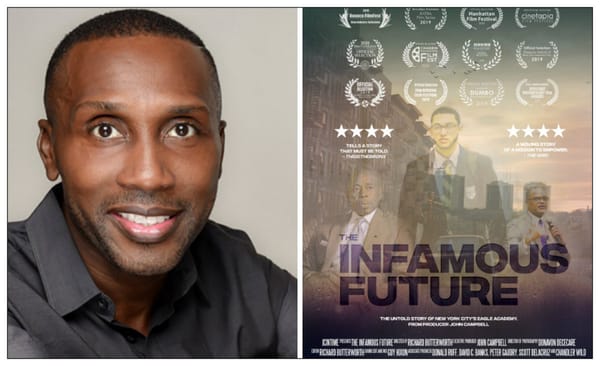"The Infamous Future" At FilmColumbia Produced By Columbia County's John Campbell
John Campbell's documentary sheds light on the untold story of New York City's Eagle Academy.

John Campbell's documentary sheds light on the untold story of New York City's Eagle Academy.

“You are stepping into a world that doesn’t care for you,” David Banks tells a sea of young black and brown men dressed in blue caps and gowns, the mainstay uniform for high school graduates across the country. “You are going to have to face challenges each and every day.” Banks is the President and CEO of the Eagle Academy Foundation, the "mother board" which governs the Eagle Academy, an all-boys public school in the Bronx. The academy also has satellite schools in Harlem, Brooklyn, Queens, Staten Island, and Newark, NJ, and is the subject of writer/producer John Campbell’s latest documentary, “The Infamous Truth,” directed by Richard Butterworth.
The documentary, which has already garnered 17 Official Selections and four Best Documentary awards since January, will be screened on Friday, Oct. 25 at 4:15 p.m. at Morris Memorial in Chatham, New York as part of the FilmColumbia festival which runs through October 27. There will be a post-screening party at Boxwood Linen on 22 Main St.
“The first thing I want is for each person who sees the film to be inspired,” says Campbell in a phone interview. “I want people to feel that call to action, not just about Eagle Academy but in their own communities.”
Campbell himself recently “found” his own community in Austerlitz, N.Y. exactly one year ago.
“I started coming up to Austerlitz [from Brooklyn] in 2015 and was able to find a gem of space and privacy. At first, I was coming up for the weekends, and the more that I got to know Columbia County, and made some friends, I decided in August 2018 that I wanted to live in Upstate New York full time,” says Campbell of his new hometown, a far cry from Brooklyn. But there are similarities between the two locations — proximity to shops, restaurants, art — that attracted him to Columbia County. “The other most important quality is peace and quiet, a place where I have the advantage of a good mental health environment.”
Campbell still keeps a foot in the door of his 17-year career in the financial industry (working in many global divisions including Citi Private Bank, and as Chief of Staff for Citigroup’s Global Digital Strategy), and has shown the documentary to some key players in corporate America who have felt the call to action and answered it quite loudly. He says that a few large companies have set up private internship opportunities for Eagle Academy grads (and even current students) and that the offers, and interest and passion, just keep on coming.
“People want to be a part of the change. It’s very easy to be a viewer of the documentary, but it also has to inspire action,” says Campbell, who hails from London where he studied music, law, and computer technology. He has family scattered over the globe in London, Jamaica and Quebec. “I’m a black man living in this country and I need to tell some of our stories. We have to be a part of telling our own story!”
When Campbell began production on "The Infamous Future," which at that time didn’t have a working title, he had no intentions of going into any high schools at all. He says that he and Butterworth were filming raw footage for a more general piece on “the issues in education” at the college level. After nearly six months (and 600 hours) of filming at NYU, Fordham and UMass, Campbell was told, emphatically, that he really needed to meet Banks.
“So, I walked into his office not really knowing what to expect and he said to me ‘I have the greatest story that’s never been told.’ Then he took me, personally, to all six Eagle Academy schools one by one,” Campbell recalls. “That’s when I said to my director that maybe we should start over. He agreed.”
And start over they did. The transition from pristine, well-funded college campuses to the vibrant, but worn, halls of the Eagle Academy schools was a seamless one. Campbell and his team were able to connect with then-senior Joshua Perez, the only child of a single mother who herself did not graduate from high school. His situation mirrors that of many of the young men who attend the Academy.
“The school is not replacing the families of these young men,” says Campbell, "the school is supporting the families. These kids go to school six days a week, and on the weekend they have mentorship days where someone could be giving a tutorial on how to tie a tie, there could be someone at the school giving haircuts…these students always have a place to go.”
Perez — now in his second year at Nazareth College — is the bright hook on which the story hangs. Unlike the myriad op-ed pieces on the preschool-to-prison pipeline and the media onslaught about the unsolvable problem of gang violence in this country, Perez’s story and the story of Eagle Academy is filled with hard-earned hope. And other schools want in on what Eagle’s got. Campbell said that he gets calls from different community organizations wanting to learn more about the Eagle model, and to emulate it in their own schools. In fact, during filming, Eagle Academy was already working with other public schools in New York, trying to bring the model to classrooms (boys and girls) across the five boroughs.
“They’ve seen what’s possible, and they want that for their own communities,” says Campbell.